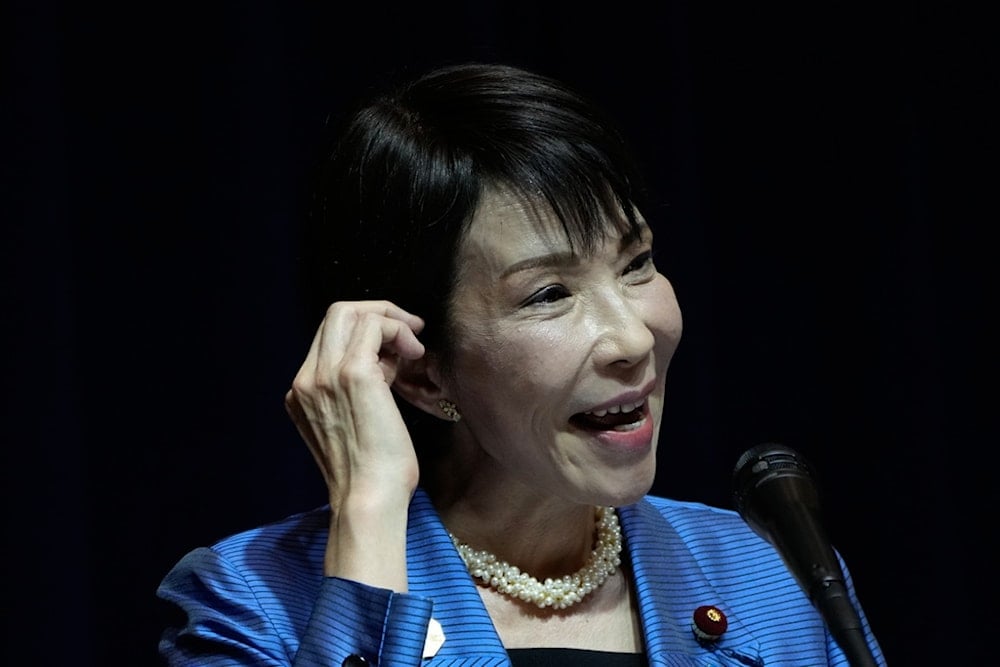Japan’s Takaichi defends $135 bln stimulus as ‘responsible’
Japan’s Prime Minister Sanae Takaichi defends a $135 billion stimulus as fiscally “responsible” despite market turbulence, a weakening yen, and rising inflation.
-

Japanese Prime Minister Sanae Takaichi speaks during a press conference after the South Korea Asia-Pacific Economic Cooperation (APEC) Summit in Gyeongju, South Korea, on November 1, 2025. (AP)
Japanese Prime Minister Sanae Takaichi defended her government’s newly approved $135 billion stimulus package, insisting the expansive spending plan remains fiscally “responsible” even as markets signal growing anxiety over Japan’s economic direction.
The ¥21.3 trillion package, Takaichi’s first major economic initiative since taking office last month, is aimed at jumpstarting growth in the world’s fourth-largest economy, where household frustration over rising prices toppled her predecessor.
But expectations of aggressive spending have already pushed Japanese government bond yields to record highs this week and weakened the yen further, complicating Tokyo’s efforts to curb inflation.
“Responsible proactive fiscal policy means a forward-looking fiscal strategy and does not aim to pursue scale recklessly or expansively,” Takaichi said in Tokyo.
She added that her approach to public spending would be anchored in “wise” and targeted investment.
“By thoroughly implementing the concept of wise spending, we will strategically deploy fiscal measures to protect the lives of our citizens and build a strong economy,” she asserted.
Takaichi also insisted that growth-oriented stimulus and fiscal discipline can coexist.
“While fostering a strong economy and increasing the growth rate, we will reduce the government debt-to-GDP ratio, achieve fiscal sustainability, and secure trust from the market,” the Japanese prime minister added.
Japan’s debt-to-GDP ratio, roughly 250%, remains the highest among major developed economies.
Read more: Toyota rejects $10 bln US investment claim in Japan
Stimulus aims to offset rising prices
The measures include energy subsidies and tax cuts, designed to cushion households facing surging living costs. Inflation has proven stubborn: core consumer prices rose 3.0% year-on-year in October, up from 2.9% the previous month.
Rice prices, a key indicator in the Japanese consumer basket, were 40% higher than a year earlier, highlighting the strain on families even as inflation for the staple slows.
Economic data earlier this week showed Japan’s economy contracted 0.4% in the third quarter, marking the first decline since early 2024.
Finance Minister Satsuki Katayama hinted strongly that Tokyo may intervene in currency markets if the yen continues sliding, saying the government would take “appropriate action against disorderly [foreign exchange] moves.”
Analysts warn that further yen depreciation, driven in part by expectations of heavier government borrowing, risks amplifying inflation.
“Japan has been engaged in expansionary economic policies for so long without being able to stimulate the economy,” Margarita Estevez-Abe of Syracuse University’s Maxwell School told AFP.
“Meanwhile, Japan’s public debts increased,” she said.
This further depreciation of the yen will “hit ordinary Japanese households with higher prices,” Estevez-Abe explained.
Read more: China travel warning triggers market losses in Japan
Diplomatic tensions with China escalate
Takaichi’s economic plans also unfold amid a growing diplomatic row with China after recent comments she made about military interference in Taiwan.
Beijing summoned Japan’s ambassador and issued a travel advisory for its citizens. Chinese tourists, the largest foreign demographic in Japan, represent a crucial pillar of the country’s services sector. Media reports this week suggested China may also suspend imports of Japanese seafood, though neither side has officially confirmed the move.
The spat follows remarks by the prime minister implying that Japan could intervene militarily if the Chinese government took military action in the island of Taiwan. Her comments drew swift backlash from Beijing for Tokyo's undermining of the One China principle.
Takaichi on Friday attempted to defuse the situation, reaffirming that Japan’s long-standing position on Taiwan remained “unchanged” and calling for “constructive and stable” ties with China.
Washington, meanwhile, emphasized its backing of Japan, after its improving ties with Beijing drew fears from Taipei and Tokyo.
The US State Department said its commitment to the US-Japan Alliance, including the defense of the contested, Japan-administered Senkaku Islands, which lie in close proximity to Taiwan, was “unwavering.” The uninhabited islands, known in China as the Diaoyu, remain a perennial flashpoint, with China deploying coast guard vessels near the territory in recent days.
“We firmly oppose any unilateral attempts to change the status quo, including through force or coercion, in the Taiwan Strait, East China Sea, or South China Sea,” State Department spokesman Tommy Pigott wrote on X.

 4 Min Read
4 Min Read










